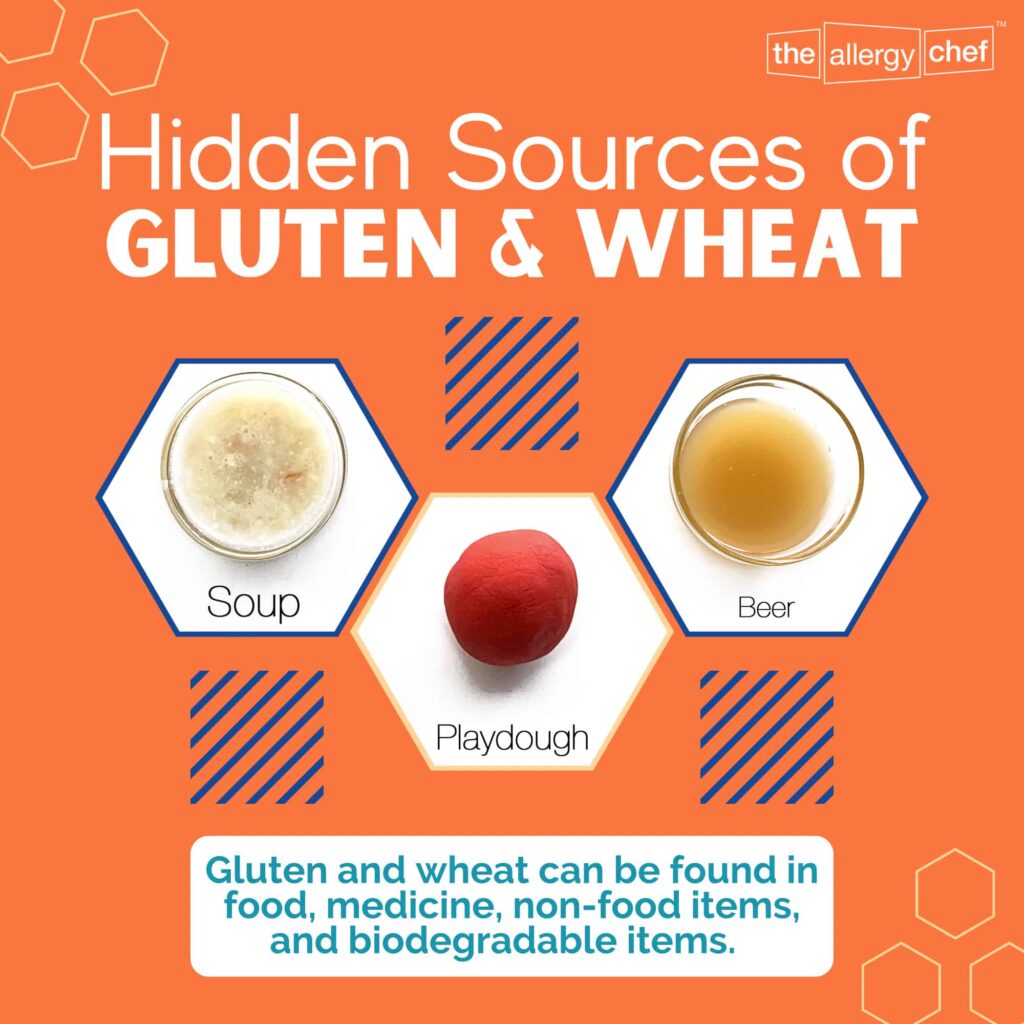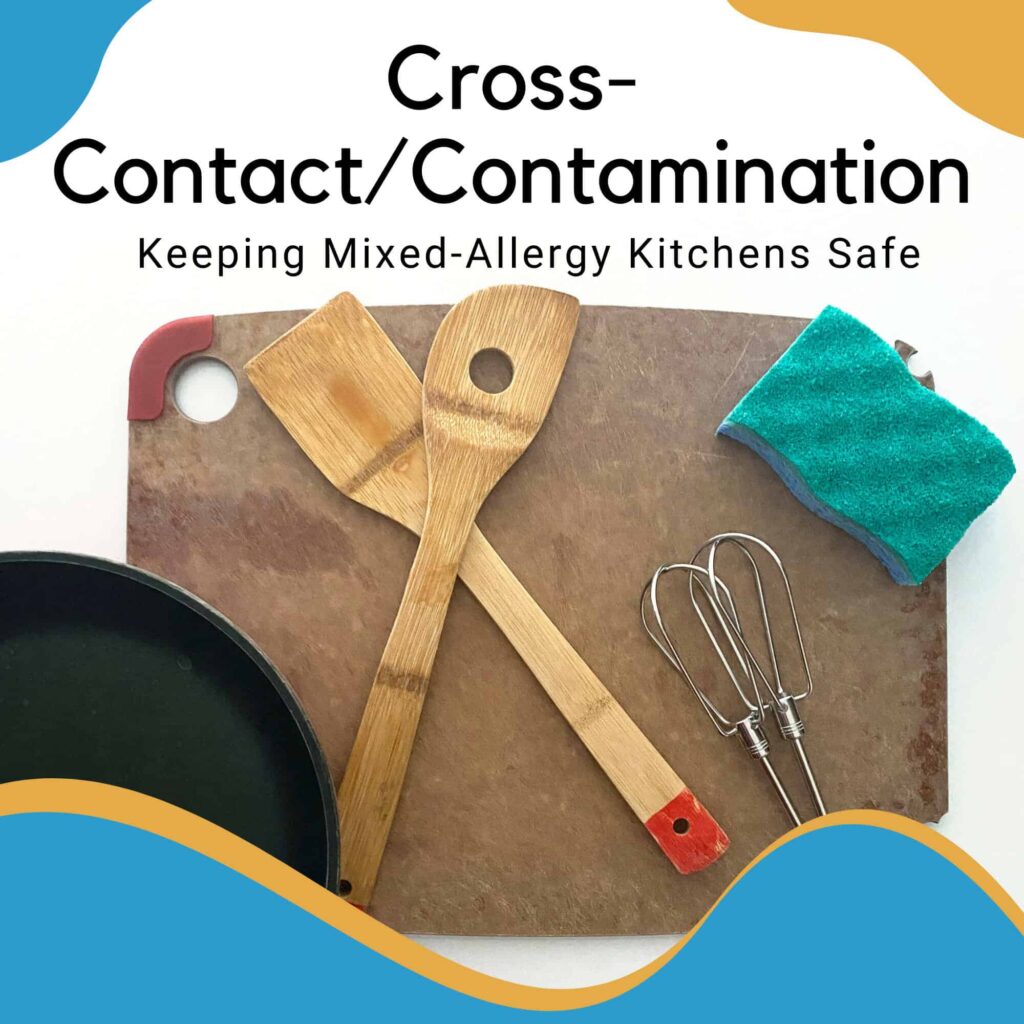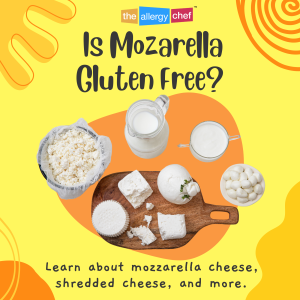Is mozzarella cheese gluten free? Generally speaking, yes, it’s a gluten free product. This is especially true of organic and high quality mozzarella cheese in its purest form. If you have Celiac Disease (an autoimmune condition where the person experiences adverse reactions when eating foods containing gluten) it’s important to understand how gluten-containing ingredients can find their way into dairy products.
What is Mozzarella Cheese
Mozzarella cheese is a mild, semi-soft cheese. It’s often seen on pizzas and in specialty salads such as a Caprese salad. Mozzarella comes in two formats, and with this type of cheese, you’ll either see it sold as “fresh mozzarella cheese” or as “mozzarella cheese”. The fresh format is sold as a ball mostly submerged in water.
Typical Ingredients in Mozzarella Cheese
As you shop for mozzarella cheese, you’ll see the same type of ingredients again and again. Each brand may have a slightly different set of ingredients, but these are what you’ll usually see:
- Pasteurized Whole Milk
- Cheese Cultures
- Salt
- Enzymes
- Potato Starch
- Cellulose Powder
- Citric Acid
- Lactic Acid
Ingredients You May See That are Gluten Free
Often times, shredded cheeses have additional ingredients added during the manufacturing process, and this extended to shredded mozzarella cheese as well. Cellulose powder, an anti-caking agent is a great example of an added ingredient. These are some of the most common additives you’ll see in the ingredients list:
- Tapioca Starch
- Potato Starch
- Natamycin (natural mold inhibitor)
- Citric Acid
Related Articles
 |
 |
Processed Cheeses and Gluten-Related Disorders
If you’re following a strict gluten-free diet, most natural cheese products will be safe for you to consume. The issue for those with Celiac Disease and other gluten-related disorders is when lots of additional ingredients are present in the product. A good example of this is dairy free cheese. Another example is low-quality novelty cheese products (think cheese in a can, etc.). Here’s a list of cheeses that are generally more processed than a block of cheese that can contain red flag ingredients:
- American Cheese
- Breaded Cheese Sticks (deep fried)
- Cheese Dips & Spreads
- Cheese Sauce
- Cheese Shreds
- Cheese Slices
- Powdered Cheese
- String Cheese
Dairy Free Cheese & Vegan Cheese Ingredients
Many people who are dairy free are also gluten free for a range of health reasons. If you fall into that category, the great news is that there are lots of dairy free cheese options that are also gluten free.
A bit of a warning: If you’re new to dairy free living, be careful with DF cheese. It has a distinct taste that not everyone enjoys. It can take up to a year to “forget” the taste of cheese so you’re more likely to enjoy your new options. If you can have tree nuts, start with a brand such as Miyoko’s, as their dairy free cheeses have great texture.
Here’s a list of common items found on the ingredient list of dairy free cheese products:
- Annato
- Artificial Flavors
- Citric Acid
- Coconut Oil
- Corn Starch
- Food Starch
- Nutritional Yeast
- Potato Starch
- Rice Products
- Tapioca Starch
Red Flag Ingredients to Look Out For & Cheese That May Contain Gluten
As you read an ingredient label, these are potential gluten-containing ingredients to be on the look out for:
- Artificial Color
- Artificial Flavor
- Maltodextrin
- Modified Food Starch
- Natural Flavor
- Spices
- Wheat Protein
- Wheat Starch (sometimes written as gluten free wheat starch)
- Vinegar (make sure it’s not malt vinegar which is barley derived and contains gluten)
It’s so important to contact a manufacturer about these ingredients, as many have different source options. For example, maltodextrin is commonly derived from corn, tapioca, rice, and wheat. The most common type commercially found is corn.
With some cheeses, during the creation process, gluten-containing products are used. Here are some cheeses to be cautious about:
- Beer Cheese (this is a specialty cheese made with beer, and most beer is not gluten free)
- Blue Cheese, sometimes called Bleu Cheese (here’s great info if you have a mold allergy, sometimes the mold used is grown on rye or wheat)
- Cheese Spread (some contain gluten-containing ingredients for textural reasons)
- Cottage Cheese (some brands use gluten based starches)
- Shredded Cheese (some brands use gluten based starches)
Both the Spokin app and Fig app are great resources to have on your smartphone. The Spokin app allows you to see products based on your needs. The Fig app allows you to scan a product’s barcode to learn more about the product. These can help you easily determine if a product is gluten free.
It’s important to note that here in the United States, gluten is not considered a major allergen. In the EU, where they have the Top 14 Allergens, gluten is considered a major allergen. What that means is that in the US, gluten does not have to be called out in the allergen statement. Wheat on the other hand does, as it’s one of the US Top 9 Allergens.
The nice things about dairy products is that they’re naturally gluten free. It’s the additives and additional ingredients you have to look out for, as well as shared equipment etc.
More Cheeses to Enjoy
If you have a wheat allergy, gluten intolerance, Non-Celiac Gluten Sensitivity, or Celiac Disease, the good news is that there are many types of cheese you can safely enjoy. Generally speaking, with all well made cheese, the gluten content will be zero.
If you have a specialty cheese shop in your area, I strongly encourage you to visit. They’ll have so many varieties of cheese for you to sample and you’ll probably go home a very happy camper. Some cheese options include:
- Cheddar Cheese (Sharp Cheddar & Mild Cheddar Cheeses, etc.)
- Cream Cheese (make sure it’s not sold with something else such as crackers, only purchase a standalone tub of cream cheese)
- Parmesan Cheese
- Camembert (one of many edible rind cheeses)
- Feta (available from sheep’s milk in addition to cow and goat milk)
- Mascarpone (has a high fat content and great in desserts)
- Ricotta (amazing for pasta, Kite Hill has a great dairy free version for those who need it)
For a more complete list of cheeses, check out this list on US Dairy.
Answering Your Cheese Questions
Do you know of a good dairy free mozzarella cheese?
I’d suggest trying the Miyoko’s brand first. There are very few dairy free cheeses that people who can have cheese enjoy. This is one of them, and I’d attribute that to the cashew content of this specific brand. Their dairy free cheese are incredibly creamy, and popular among those who need dairy free options.
Is there a nut free alternative to mozzarella cheese that’s also dairy free?
Here in the US, coconut is counted as a tree nut by the FDA (food and drug administration). There’s a lot of argument about this because coconut is a drupe. If you can have coconut, check out the brands Follow Your Heart and Daiya. They may have one that works for you. If you can’t have coconut, look into the brand Oatzarella. My kids say it doesn’t really taste like cheese, but it can make your dairy free foods feel creamy.
If I have a lactose intolerance, can I eat mozzarella cheese?
Yes, you can. Also know that fresh mozzarella has more lactose than the firmer option. Both FODMAP Everyday and The Cheese Professor have great information on cheeses you can eat if you have a lactose intolerance.
Is a Mexican blend cheese gluten free?
Most Mexican blend cheeses sold in stores are a shredded cheese, which can be problematic due to the the additional ingredients. It’s important to flex your label reading skills and make sure none of the additional ingredients are potentially gluten-containing ingredients. Generally speaking, yes, this cheese should be gluten free. However, you’ll have to confirm that with the label and reach out to the manufacturer if needed.

